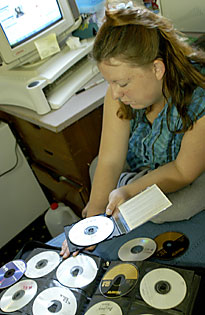 |
|
JACOB KONST/Arizona Daily Wildcat
|
Daniele Kinsey, veterinarian science freshman, labels burned CDs in her dorm room at Coconino Residence Hall.
|
|
|
By Ashley Nowe
Arizona Daily Wildcat
Monday, September 29, 2003
As UA sophomore Andy Lovato sat at his computer, downloading the latest Pennywise song, the last thing that crossed his mind was fear of being sued.
In fact, as he clicked the mouse, his only thoughts were that of defiance and rebellion.
"I think it is bullshit," Lovato said. "I use it to find out if I like an artist. If I like the music then I will buy it."
Earlier this month the Recording Industry Association of America (RIAA) filed 261 lawsuits against individuals nationwide for downloading music from the Internet, many of which were between the ages of 18-29, according to an article in the New York Times.
Despite the RIAA's attempt to stop music piracy, the use of popular file sharing programs like Kazaa and WinMx only dropped by 5 percent after the lawsuits were filed.
The UA has not received any subpoenas and the complaints from the RIAA regarding students file-sharing on the dormitory computer networks dropped slightly, but the cause is uncertain, according to Karen Williams, the copyright librarian that handles downloading complaints.
"The lawsuits probably aren't affecting student mentality," said Steve Gilmore, assistant director of Residence Life. "The students still seem to have the attitude of 'it probably won't happen to me.'"
More than 300 UA students between January and August received an official notice of copyright infringement.
Students who are first offenders receive a warning letter from Residence Life. If another complaint is filed against the student the matter is taken to the Dean of Student's Office.
"It doesn't make a difference to me," said pre-business freshman John Jetton. "I did it before I moved to the dorms and I am still going to do it."
Last April, the RIAA filed four lawsuits against college students directly, rather than through a university, costing each student between $12,000 and $17,500.
"All these lawsuits are definitely causing more attention to the matter than I can do, but the fact is until somebody close is on that list it probably won't stop," Gilmore said.
In fact, 82 percent of 18-29 year olds who download music, software and videos do not recognize the lawsuits as a threat and will instead continue to file-share, according to the Pew Internet Project, an organization that researches the Internet and its users.
"I know my way around the computer so I won't get caught," said pre-computer science sophomore Mark Cox, who lives in Coronado Residence Hall. "What is 200 lawsuits compared to the 14 million that file-share? It's nothing."
Despite the general attitude of defiance, some students choose not to file-share based on ethical beliefs.
"I think it is stealing from a corporation," said Anthony Hinckley, a senior majoring in English and creative writing. "Just because technology allows us to steal, doesn't mean that it's all right."
File-sharing legally violates copyright law under the Digital Millennium Copyright Act, which was passed in 1998 after file sharing programs like Napster became mainstream.
"What should be illegal is charging 20 bucks for a CD," said sophomore Josh Robinson. "Most of the money goes to the recording industry anyway and not the artists."
Musicians from local band Troy's Bucket, who just released a new CD, would prefer that fans bought the album, but feel that downloading music does offer them positive publicity.
"If I can get my music to millions of people, well, regardless if they are buying my CD, they are coming to my shows, buying merchandise and telling their friends about me and I forge a nice career," said James Lesure, a music junior and the vocalist for the band. "Let ripping and burning continue and multiply. Billion-dollar corporations can find other ways of ripping us off."
The record industry warns that the lawsuits are the first of many more to come.
"I am too scared to download music," said ecology and evolutionary biology freshman Amanda Davis, who lives in the Navajo Pinal-Sierra Residence Hall. "I downloaded before all this, but I haven't downloaded since. I don't want people getting into my computer and besides I don't want to get in trouble for something stupid like this."
The RIAA has an amnesty program for file-sharing individuals not under investigation, which entails signing a promissory note agreeing not to file share. Individuals who promise to stop file-sharing are protected from prosecution.
"I download all the time, and I'm going to keep doing it," Lovato said. "This just isn't going to stop students from downloading."

